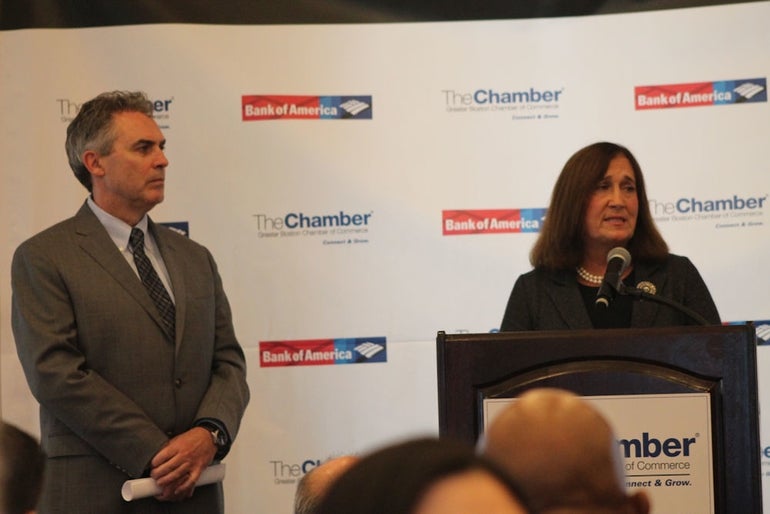Seeing profit growth at the Massachusetts Lottery stall while the unrestricted local aid it provides is needed as much as ever, Treasurer Deborah Goldberg next session will file and champion legislation to allow the Lottery to offer its products online and on smartphone apps.
Convenience store owners, who rely on the Lottery to attract customers to their stores, and responsible gaming organizations have resisted a Lottery move to make its products available on the internet. But in a political environment where new taxes are opposed by the governor and tax collection growth has slowed, non-tax revenue sources like the Lottery are being eyed by some lawmakers for potential cash and Goldberg, who manages the Lottery, is poised to press for passage of her bill.
“Our lottery … is the most successful in the country, and the only source of unrestricted local aid to all 351 cities and towns in our state,” Goldberg said Wednesday morning at a breakfast hosted by the Greater Boston Chamber of Commerce. “And I’d like to keep it that way.”
The treasurer told the crowd at the Omni Parker House Hotel that she will file her bill to facilitate online sales for consideration in the next legislative session. Her office said Goldberg will file the bill by Nov. 2, about a month before she will forecast future Lottery profits for state budget writers.
“As a former local elected official, I know firsthand that unrestricted local aid is critical,” the former Brookline Board of Selectmen chair said. “It can help pay the salary of a classroom aide, provide emergency overtime for public works employees who snow plow streets all night only to collect garbage the next morning, and it delivers countless other services that communities need.”
Lottery profits, which are delivered to cities and towns as local aid, were essentially flat last year and online Lottery boosters view the move as a needed transition if the Lottery is to hold its ground in gaming.
The Lottery announced in July that it expects to return to the state $986.9 million in net profit from fiscal year 2016. Though that sum is the largest in the Lottery’s history, it is just $1 million more than the previous year and Goldberg said Wednesday that $27 million of the profits came from the world record $1.5 billion Powerball jackpot in January.
“Without that, I might be reporting a lottery downturn,” she said.
The Lottery has also begun to see scratch ticket sales decline, particularly concerning because the instant tickets account for about 70 percent of total Lottery sales, the treasurer said.
Goldberg has repeatedly said she wants to find a way to make Lottery products available online while minimizing damage to the Lottery’s retail partners. On Wednesday, she addressed another frequent criticism of online lottery products: that an online lottery would be harmful for gambling addicts and would render age restrictions moot.
“Interestingly enough, industry experts have stated that moving the lottery online will allow us to better monitor players who have a gambling problem,” Goldberg said. “It can set spending limits, track who plays and how often, and permit self-exclusion. Those capabilities are simply not available currently.”
The Lottery made unsuccessful attempts this session to get a legislative green light to move online. Sen. Jennifer Flanagan filed a budget amendment to allow the Lottery to look to the internet, but she withdrew it — often a sign that an amendment lacks support or is not favored by leadership.
The Senate added the authorization to its late-session economic development bill — by a narrow 22-17 vote — but the House didn’t go along with it and it was dropped from the bill that emerged from conference committee and was sent to Gov. Charlie Baker’s desk. A redraft of a Flanagan bill (S 2351) technically remains alive this session, but the bill appears unlikely to emerge from the Senate Ways and Means Committee.
According to the Council of State Governments, at least four other states — Kentucky, Illinois, Georgia and Michigan — have already authorized their lotteries to sell at least some products on the internet. The Minnesota State Lottery in 2014 began offering scratch tickets online and at gas pumps without the consent of the state Legislature, and lawmakers passed a law in 2015 to end those sales, according to the council.
The Massachusetts Lottery has already begun to study some of the possibilities the internet could hold. In December, the Massachusetts Lottery Commission issued a request for information, inviting organizations to submit proposals for development, implementation, operational support and maintenance of an online lottery system.
That RFI — which garnered 20 responses — asked for proposals for “the development and integration of digital versions of existing and new lottery games (‘iLottery Games’), including but not limited to social gaming and daily fantasy sports options.”
Goldberg cautioned lawmakers, as they prepared to write the fiscal 2017 budget, that the string of record Lottery sales would not continue unless the Lottery adapts to compete with the state’s growing casino gaming industry and daily fantasy sports contests.
The treasurer touted the idea of a Lottery-run fantasy sports game, which she said would attract a younger audience that favors playing on mobile devices, particularly 25-to-45-year-old males “who are not Lottery players (and) who are extremely excited by sports-related fantasies.”

